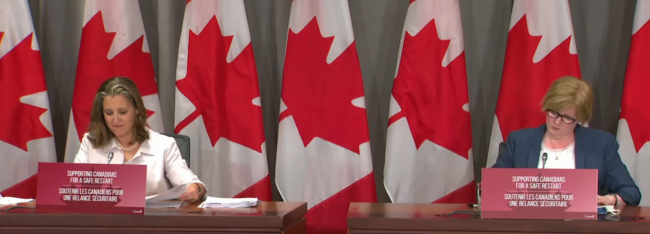August 21st 2020
There’s a global pandemic. A deep recession. And a federal budget deficit the size of last year’s revenues.
Chrystia Freeland is becoming finance minister in interesting times.
To make matters even more interesting, the country is divided. Like so many times in the past, it’s divided along political lines, with a minority government and five parties jockeying for position in the House. But just as importantly, COVID-19 has revealed deep rifts in a Canadian society that is divided along the lines of income, gender, and race.
This is the Canada the prime minister contemplates as he drafts next month’s speech from the throne. Based on news reports, Justin Trudeau’s goals are ambitious: to lift the country out of recession, to address inequality, and to transform the economy in response to the ongoing climate emergency. Minister Freeland’s job is to finance those plans, and to do so, she must begin with an assessment of where we are now.
We have learned a lot about the pandemic and its economic impact since the Canada Emergency Response Benefit (CERB) was first introduced in mid-March.
While most higher-income Canadians continued to earn their salaries and safely work from home during the shutdown, many more low-wage workers found themselves either unemployed or compelled to keep working at essential services that put their health and the health of their families at risk. Since the economy has started to reopen, women with children under 12 have lagged far behind men and other women in recouping their hours lost during the shutdown. Racialized Canadians, who are overrepresented in low-wage occupations and industries, are facing both higher rates of COVID-19 and higher unemployment rates.
"This is no time for half measures or pilot projects. For this plan to work, we must spend big. And that is where Chrystia Freeland must shine."
We have also learned that decades of underfunding of public services and a tattered social safety net have worsened the impact of the pandemic. Public programs from long-term care to child care to employment insurance (EI) have not been up to the challenge of COVID-19. Even federal government computer systems have been taxed.
But the pandemic has had a silver lining: It has shown Canadians that, in a real crisis, a government can take quick, decisive action that solves problems and makes life better for everyone. We have been reminded of the value of public services and the public sector in our lives. As the pandemic continues and the climate emergency deepens, we can see clearly now that governments must take on a larger role in the economy and in society.
The throne speech must set out concrete parameters for the government’s recovery plan that go beyond repeating the words “green, equitable and inclusive.”
On Thursday, the government announced its plan to broaden access to EI and provide new income supports for unemployed workers who don’t qualify for EI for the next year. The ministers said the estimated costs for this were about $29 billion. That suggests a government that’s willing to spend money to support Canadians’ incomes, at least over the next year, but Parliament must approve the plan when it meets in September. And this is still a minority government.
In addition to income supports, any recovery plan must also direct money to rebuilding public services, with universal public child care at the top of the agenda so women can get back to work.
A plan to decarbonize the economy means signalling a definitive end to the fossil fuel era and ushering in a new vision for Canada: A diversified, green economy that works for workers and communities, serves the well-being of society, and drastically cuts our greenhouse gas emissions.
This is no time for half measures or pilot projects. For this plan to work, we must spend big. And that is where Chrystia Freeland must shine.
Freeland’s predecessor reportedly balked at new spending that could potentially equal what has already been shelled out for the COVID-19 response. Bill Morneau shouldn’t have. While the federal debt-to-GDP ratio has risen, the books are still in much better shape than they were through much of the 1990s. Interest rates have plunged to levels not seen since the Second World War, so much so that the cost of servicing today’s debt is actually lower than it was six months ago. Canada’s debt is an investment, not a problem.
Nonetheless, we will need more revenue to pay for an increased role for government and a less unequal society. That means raising taxes.
Federal tax revenues as a share of GDP are down substantially from where they were a generation ago. This change has fed inequality, leaving more and more of the country’s wealth in the hands of those who need it least. Despite COVID-19, Canada remains a rich country, but some redistribution is in order. From grocery clerks to personal support workers to everyone else who has been shortchanged by this economy, we all deserve a fair share of the wealth we have created together. Reforming tax rules that overwhelmingly benefit the rich is the tool to make it happen.
Minister Freeland has a clean slate, a rich country, and a golden opportunity in front of her.
It’s a great time to be the finance minister of Canada.
Sheila Block is a senior economist with the Ontario office of the Canadian Centre for Policy Alternatives.
[Top photo: Finance Minister Chrystia Freeland (on the left; Minister of Employment, Workforce Development and Disability Inclusion Carla Qualtrough on the right) has a clean slate, a rich country, and a golden opportunity in front of her. Livestream screenshot]

